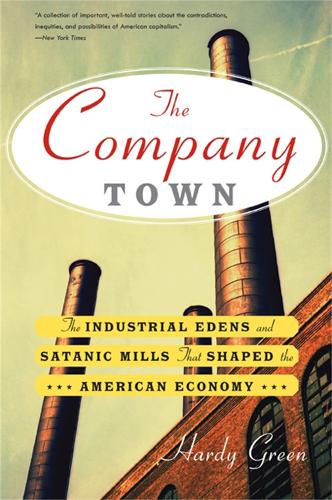
The Company Town: The Industrial Edens and Satanic Mills That Shaped the American Economy
(Paperback)
Publishing Details
The Company Town: The Industrial Edens and Satanic Mills That Shaped the American Economy
By (Author) Hardy Green
Basic Books
Basic Books
31st July 2012
United States
Classifications
Physical Properties
Paperback
272
Width 140mm, Height 210mm
Description
Company town: the very phrase sounds un-American. Yet company towns are the essence of America. Hershey bars, Corning glassware, Kohler bathroom fixtures, Maytag washers, Spam,each is the signature product of a company town in which one business, for better or for worse, exercises a grip over the population. In The Company Town , Hardy Green, who has covered American business for over a decade, describes the emergence of these communities and their role in shaping the American economy since the country's earliest years. But rather than adhering to a uniform blueprint, American company towns have come to represent two very different strands of capitalism: one humanistic, the other exploitative. Through the framework of this dichotomy, Green provides a compelling analysis of the effect of the company town on the development of American capitalism, and tells the sweeping tale of how the American economy has grown and changed over the years.
Reviews
Simon Johnson, Professor at MIT Sloan and co-author of the national bestseller 13 Bankers: The Wall Street Takeover and the Next Financial Meltdown "A brilliant tour through inequality, writ large and small, across the ages. Economics is often considered as 'dismal' and you may not be cheered up by what has been regarded as an acceptable distribution of income in the past (and what may be coming to our future). But The Haves and the Have-Nots is far from being a dismal book - it is entertaining, draws you in, and makes you think; this is the right way to draw attention to the substantive issues. Enrollments in economics courses would rise sharply if more writers followed Branko Milanovic's lead." Moises Naim, Senior Associate, Carnegie Endowment for International Peace, author of Illicit: How Smugglers, Traffickers, and Copycats are Hijacking the Global Economy "This is one of the most entertaining and original books you can read on a hot-button subject that will increasingly dominate the conversations in homes and government offices around the world. Economic inequality has always been part of the human experience and Branko Milanovic masterfully explains why it is still with us and why politicians, policy makers and the public are so often allured by policies that deepen inequality instead of reducing it. A delightful read!" USA Today "[S]eriously conceived, breezily written... His historical cases studies are instructive... Green is skilled at sketching complexities with relative compactness." New York Journal of Books "[Branko Milanovic] has fun with economics... Behind the fun are some serious concerns about growing global income inequality... And underlying the fun facts is a prodigious amount of research: everything from demographic patterns in 13th century Paris to interest rates in ancient Rome." Library Journal "[A]n innovative look at price and consumption differences... Students, practitioners, and anyone interested in economics and the issue of inequality would enjoy this." Booklist, starred review "Milanovic defies the typical image of an economist by presenting research overlaid with humor, literary insights, and fully imagined portraits of daily life as he examines inequality across time and continents... Milanovic writes as much like a philosopher as an economist as he ponders the growing trend of inequality in income around the world and answers questions many readers likely ask themselves about their economic prospects." Kirkus Reviews "[A] timely look at the inequality of income and wealth... Authoritative." James K. Galbraith, author of The Predator State: How Conservatives Abandoned the Free Market and Why Liberals Should Too "Charming, erudite, curious and deeply informed about every aspect of economic inequality. Branko Milanovic takes us on a tour from Austen to Tolstoy, from ancient Rome to modern Brazil via the late Soviet Union. He explores almost all the ways of thinking about inequality that there are. And he makes it seem easy, which it definitely is not." Angus Deaton, Professor of Economics and International Affairs, Princeton University, 2009 President of the American Economic Association, author of The Analysis of Household Surveys: A Microeconometric Approach to Development Policy "Where do you rank in the all-time world distribution of income How about Jane Austen's Mr. Darcy Or Anna Karenina Was Octavian Augustus richer than Bill Gates Why might China fall apart, like the USSR and Yugoslavia Why should we care about differences in income and wealth In this book of many delights, Branko Milanovic, who has spent 25 years studying global inequality, provides us with a veritable Arabian Nights of stories about inequality, drawing from history, literature, and everywhere in the world. A pleasure to read, and an eye-opener for haves and for have-nots alike."
Author Bio
Hardy Green is a former Associate Editor at BusinessWeek, where he was responsible for the magazine's book review coverage. He still writes regularly about the book publishing industry, and has published features on travel, investing, business history, technology, and careers. He is also the author of the academic history On Strike at Hormel: The Struggle for a Democratic labour Movement. Green has taught history at New York's School of Visual Arts and Stony Brook University, from which he holds a Ph.D. in US History. He blogs at hardygreen.com, and lives in New York City.
